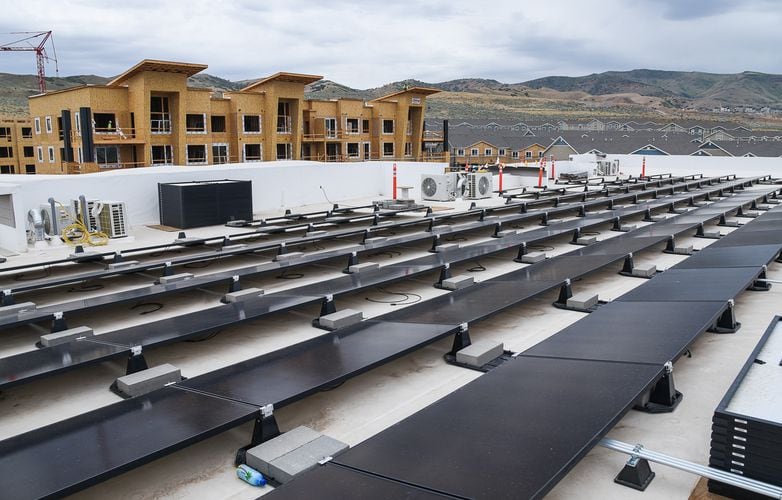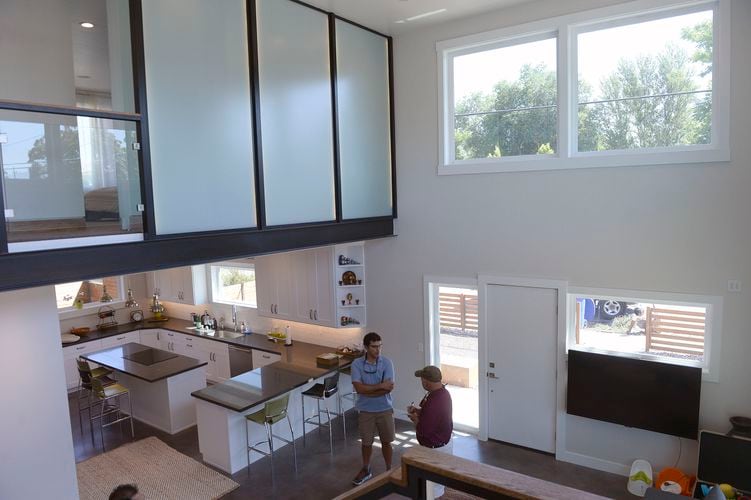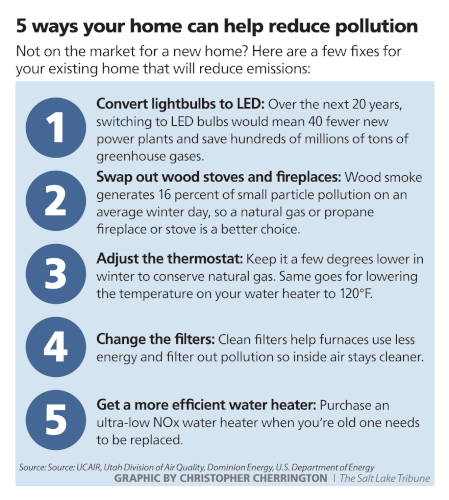The all-electric home: Tackling air pollution by cutting off natural gas
Author: Heather May
May, Heather. The all-electric home: Tackling air pollution by cutting off natural gas. August 17, 2019
0 General Document comments
0 Sentence and Paragraph comments
0 Image and Video comments
Editor’s note • Through a grant from Solutions Journalism Network, The Salt Lake Tribune is examining lesser known contributors to air pollution — our homes and our workplaces — and possible solutions to mitigate the effects they have on the air we breathe. In the second of a three-part series, we focus on the promises — and concerns — of homes powered solely by electricity. Read part 1: Homes are a big part of Salt Lake City’s air pollution problem. They also are the solution. Read part 3: How small businesses in Salt Lake City are helping to clear the air.



Herriman • The apartment complex rising on the southwestern edge of Salt Lake County looks like any other forming on empty lots, former farmland and razed scrub oak seemingly everywhere in Utah. But the 600-unit complex called Soleil Lofts is unlike anything seen in Utah — or in the United States, according to developer Wasatch Premier Communities and its partners.
Soleil Lofts is on the front lines of low-pollution housing: 12,000 solar panels will eventually cover the roofs, delivering most of the community’s energy needs and feeding power to batteries in each home that can be used as a backup source in case the power goes out.
More importantly, the batteries will be tied to the electricity grid and managed by Rocky Mountain Power. RMP will use the Soleil Lofts project to determine how to integrate personal batteries on a much larger scale allowing more renewable energy to be integrated into the grid.
“It really is about proving a model for the future,” says William Comeau, director of customer innovations for Rocky Mountain Power. “That future is utility management of batteries for the greater good of the system.”
And like a handful of other housing developments in Utah, Soleil will be powered with 100% electricity for its heating, cooling and appliances — no natural gas — which means it won’t contribute the type of pollution that results in the Wasatch Front having some of the nation’s worst air pollution spikes during winter inversions.



Standing on top of one of the apartment buildings among a sea of solar panels, Wasatch Premier Communities Chief Operating Officer Jarom Johnson says Soleil Lofts, which will be available for rent starting in September, is an answer to pressing questions: “How are we not adding to a smog dilemma, how are we not adding to a greenhouse gas dilemma?”

(Francisco Kjolseth | The Salt Lake Tribune) Soleil Lofts, a 600-unit complex at the southwestern edge of Salt Lake County, is on the front lines of low-pollution housing. Thousands of solar panels cover the roofs, delivering most of the community's energy needs and feeding power to batteries housed in each unit that will be tied to the power grid.
Wasatch partnered with the German solar battery company sonnen, Inc. for the individual ecoLinx batteries, which will each store up to 20 kilowatt hours of energy, about the same amount of energy the apartments will use each day, says Jay Oman, Wasatch’s development manager.
Rocky Mountain Power sought and gained approval for the project through Utah’s Public Service Commission, which had to approve it paying $3.27 million toward the $34 million solar panel and battery cost. Herriman city officials also had to verify that using lithium iron phosphate batteries in a living space is safe, according to commission reports.



Soleil Lofts will allow Rocky Mountain to fully manage the batteries. RMP will decide when to eventually export energy to the grid, when to use the stored energy — most likely in the evenings when demand is the highest — and how to use the batteries to help manage the overall grid, says Comeau. The batteries will collect not only solar power during the day but could store excess wind power at night.
“It’s like dispatching [a small] power plant,” he says. “It helps us figure out how to manage the grid with batteries for our customers in the future."
Storing the sun’s energy has long been seen as the missing link in solar power, says sonnen, Inc. Chairman and CEO Blake Richetta. Simply adding solar panels won’t reduce reliance on power plants that burn coal because the solar power isn’t available in the evening and night, when energy demand is the highest, he says. The goal with batteries is to create a virtual power plant that manages energy supply and demand and increases the use of renewable energy to eventually reduce carbon emissions and improve air quality, he says.
“You could never replace power plants with solar alone,” he says. “If you have solar and batteries [and a way to manage both], this is the scientific proof for what’s known as the energy transition: You produce the solar you use and the excess power is solar time shifted. It’s harnessed in the battery” for use when demand increases.



Going all-in on electric
Storing solar power is revolutionary. Another way Soleil Lofts will reduce pollution is by solely using electricity — not natural gas — for its heating, cooling and appliances.
While electrifying buildings and homes isn’t common in Utah, interest is growing dramatically, says Kevin Emerson, energy efficiency program director at Utah Clean Energy, a nonprofit that works to reduce energy waste and for pollution-free renewable energy.
“We’re at the beginning of a market transformation,” Emerson says.
A handful of local developers have already jumped on the electrification bandwagon.
Giv Development stopped developing buildings that use natural gas for heating in 2014. To date, the company is constructing or advising on 650 all-electric units and has advised on others.
Giv Executive Director Chris Parker says he wanted to show it would be less expensive to build an all-electric building so that other developers would do it, too. He says it costs $70,000 less to build Giv’s all-electric Project Open, a five-story apartment building at 355 N. 500 West, Salt Lake City, in 2018, than one with natural gas. Future phases and projects are projected to save even more, in part by avoiding gas lines, pipes, roof penetrations and shafts needed to protect occupants from the natural gas. That offset the higher price of the electric heating and cooling systems, he says.
Parker says Giv intentionally didn’t make Project Open “crazy efficient” by adding extra insulation or triple-pane windows because it wanted to show other developers it can be painless to move to electric.
Another developer — Redfish — recognized that poor air disproportionately affects residents in low-income areas, those with fewer resources to escape the bad air and who end up living near freeways and industrial pollution sources. Redfish builders Tiffany Ivins and Mitchell Spence built five energy efficient homes at Living Zenith at Liberty Park in 2017, and they say they saved money going electric — $5,000 less per home.

(Al Hartmann | The Salt Lake Tribune) Open kitchen and living room area in one of the new energy efficient Living Zenith homes at 1172 S. 400 East, Salt Lake City. The five homes are built tight with high insulation materials which use very little energy for heating and cooling. Aug. 10, 2017.
The homes, which include solar panels to largely offset their energy use making them net zero energy homes, were sold at a premium: between $629,000 and $750,000 for 2,600 to 2,900-square-feet.
They’ve continued to build all-electric in small developments in Salt Lake City and Heber, with a 92-unit apartment building planned near downtown Salt Lake City. Still, Ivins says they have a waiting list 40-people deep who want something similar. “We wish we could build faster. We’re small and we’ve been wrestling with that question how do you go to scale and what does that look like,” she says.
Redfish won a contest by Salt Lake City in 2017 to create an all-electric, net-zero home that would sell for $260,000, but it hasn’t been built.
“It should not just be a rich person’s game,” says Ivins. “Our goal is to see even the lower income areas benefit with net zero buildings. They’re the people who stand to gain the most of they have no electric bills.”
Habitat for Humanity of Summit and Wasatch Counties will conduct an experiment of sorts to decide which is less expensive and works better for homeowners: highly-efficient natural gas or all-electric. It will build each type of single family home. After a winter of use, Habitat will decide which method it will pursue for the 24 townhomes it’s building as part of the new Silver Creek Village development near the intersection of Silver Creek Drive and U.S. 40.
Is all-electric good for the air?
In Utah, the vast majority of electricity generated comes from fossil-fuel burning plants and we know that fossil fuels are bad for air quality. So does converting to an all-electric homes contribute even more toxic air into the atmosphere?
Actually, experts say a transition to efficient electric heating has immediate air quality benefits. Most of the fossil-fuel burning power plants are outside urban areas so their emissions don’t contribute to local bad air days, notes Utah Clean Energy’s Emerson.



(Christopher Cherrington | The Salt Lake Tribune)
Plus, as Rocky Mountain Power transitions to renewable energy generation, electrification of buildings will reduce greenhouse gas emissions in the region. Developers and consumers who care about carbon-neutral and zero-emission energy sources shouldn’t wait until RMP fully transitions to renewable energy before investing in all electric systems, says Emerson.
“The more the industry starts exploring how to use highly efficient electric heating systems at the same time the grid is decarbonizing is the ideal solution,” he says.
Debbie Lyons, Salt Lake City’s deputy director of sustainability, agrees, saying while natural gas is cleaner than coal as an energy source, the result is still harmful emissions. “When you’re burning natural gas in your furnace you’re contributing directly to our air shed,” she says.
Salt Lake City is trying to jumpstart the all-electric housing market through a new Building Electrification Initiative. Essentially, this research will evaluate how equipment — including air-source heat pumps that have gotten better in subfreezing temperatures and on-demand water heaters that use electricity and mini-split heat pumps — will fare in the city’s extreme cold and heat. The city also wants to know how the costs will compare to using natural gas.
Because burning fossil fuel contributes to climate change, Berkeley, Calif., recently became the first city in the U.S. to ban natural gas lines to new single-family homes, townhomes and small apartment buildings, starting next year. Another 50 cities are considering a similar ban.
As part of its plan to power all of Salt Lake City with renewable energy sources by 2032, Salt Lake City and other communities are working with Rocky Mountain Power to add enough renewables to the grid to meet all of the community’s electricity needs annually, says Lyons.
Dominion Energy, which supplies natural gas to homes and businesses in Utah, along with electricity or natural gas to 17 other states, says it doesn’t see electrification as a threat to its business and it’s not opposed to the trend.
Still, spokesman Don Porter says the company’s internal analysis shows that using only electricity in a building would cost consumers three times as much as using natural gas. (That hasn’t been the experience at Giv’s Project Open because they used heat pumps instead of baseboard heaters, according to developer Parker, who also lived in the development for a year.)
“A lot of homes are being built and they’re using natural gas. It’s a safe product, it’s a clean product, it’s plentiful. That’s why it’s so inexpensive,” Porter says.
Still, it’s not a simple competition between electricity and natural gas. Dominion Energy doesn’t make a profit on selling gas — it sells it for cost and makes money on maintaining and building pipelines, according to Porter.
And Dominion Energy is also tied with Rocky Mountain Power: Dominion is a partner in solar farms in southern Utah and sells its share of solar energy to RMP’s parent company. RMP also runs power plants using natural gas provided by Dominion. And Dominion doesn’t lose money when customers reduce their natural gas consumption through the Thermwise program, which saved enough natural gas in 2018 in Utah to power more than 11,000 homes, Porter says.
With a goal of being “the most sustainable energy company in America,” Porter says Dominion wants to reduce carbon emissions and the pollution that contributes to the Wasatch Front’s bad air. It’s negotiating with hog and cattle farmers to capture methane from manure to be used as a renewable natural gas energy source.
“I hate it when I wake up on a winter morning and I can’t see the mountains for all the smog. We all want to fix that. It’s going to be a long complicated process to do so.”
Where there’s a will, there’s a way
Through tax credits and depreciation credits among other methods, Wasatch Development says the price to build Soleil Lofts wasn’t too much higher than standard construction. The rental rates advertised online for Soleil Lofts — starting at $989 for a studio to $1,899 for a three-bedroom — are slightly higher or similar to other apartments in Herriman and nearby Eagle Mountain, according to a search on apartmentlist.com and rentjungle.com.
“It’s been a little bit more expensive on a per door basis, but nothing that made it impossible to get done,” says Johnson, the COO. “We believe the result is dramatically worth the effort, given the [environmental] impact.”
It’s technologically and financially feasible to build low- to zero-emission buildings, the all-electric developers say. What’s needed is more education — of homeowners, developers, contractors, realtors, appraisers and inspectors.
All are willing to share what they’ve learned to jumpstart the market: Giv plans to hire employees who will, for free, walk developers through the process of going electric, and it’s developing a how-to website. Redfish is converting a shipping container into a learning lab to illustrate net zero design and it created Utah’s Net Zero Consortium to promote events and training.
If sharing information with other developers creates competition, so be it, says Redfish’s Ivins. “There’s enough air pollution to go around.”
General Document Comments 0









0 archived comments